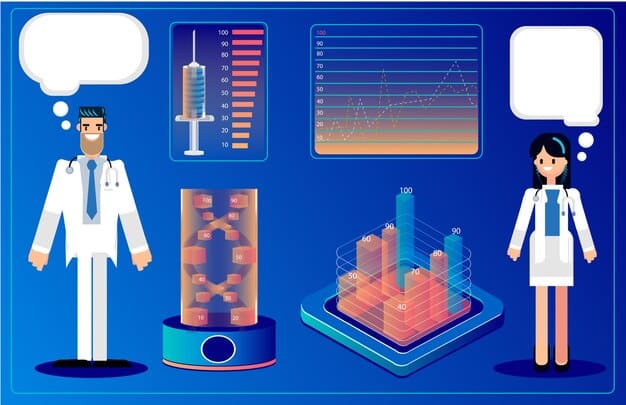Biotech Careers: Data Scientist vs. Lab Manager Salaries & Growth

Exploring biotech career paths, this article compares the salaries and growth potential for data scientists and lab managers in the United States, offering insights for professionals in the biotech job market.
Navigating the dynamic landscape of biotech can be challenging, especially when choosing between career paths. This article provides a detailed comparison of **biotech career paths: comparing salaries and growth potential for data scientists vs. lab managers in the US**, offering valuable insights to help you make informed decisions.
Biotech Data Science: An Overview
Biotech data science is a rapidly growing field that combines biology, computer science, and statistics to analyze and interpret complex biological data. Data scientists in biotech play a crucial role in drug discovery, personalized medicine, and understanding disease mechanisms.
Responsibilities of a Biotech Data Scientist
Biotech data scientists are responsible for a variety of tasks, including collecting, cleaning, and analyzing large datasets, developing predictive models, and communicating findings to stakeholders.
Skills Required for Biotech Data Science
To succeed in biotech data science, one needs a strong foundation in statistics, programming (Python, R), and bioinformatics. Domain knowledge in biology or related fields is also highly valuable.
- Statistical analysis: Proficiency in statistical methods for data interpretation.
- Programming: Expertise in Python and R for data manipulation and analysis.
- Bioinformatics: Understanding of biological databases and tools.
- Machine learning: Application of machine learning algorithms for predictive modeling.
The demand for data scientists in biotech is increasing as the industry becomes more data-driven. Companies are seeking professionals who can extract meaningful insights from large datasets to accelerate research and development.

Lab Management in Biotech: An Introduction
Lab management in biotech involves overseeing the operations of a research laboratory, ensuring that experiments are conducted efficiently and safely. Lab managers play a critical role in supporting scientific research and maintaining a productive work environment.
Key Responsibilities of a Biotech Lab Manager
Lab managers are responsible for managing lab resources, training staff, ensuring compliance with safety regulations, and coordinating research activities.
Essential Skills for Biotech Lab Management
Effective lab managers need strong organizational, communication, and problem-solving skills. A deep understanding of laboratory procedures and safety protocols is also crucial.
- Organizational skills: Managing lab resources and schedules.
- Communication skills: Training and supervising staff.
- Safety protocols: Ensuring compliance with regulations.
- Problem-solving: Addressing technical and logistical challenges.
Lab management is essential for maintaining a well-functioning research environment. These professionals ensure that scientists have the resources and support they need to conduct their work effectively.
Salary Comparison: Data Scientists vs. Lab Managers
One of the key factors to consider when choosing between these career paths is salary. Data scientists and lab managers in biotech have different salary expectations, depending on experience, education, and location.
Entry-Level Salaries
Entry-level data scientists typically earn higher salaries than entry-level lab managers due to the high demand for data science skills. Recent graduates with a master’s degree can expect a competitive starting salary.
Mid-Career Salaries
Mid-career data scientists continue to command higher salaries, reflecting their increasing expertise in data analysis and modeling. Lab managers also see salary growth as they take on more responsibilities.
Senior-Level Salaries
At the senior level, data scientists with specialized expertise in areas like machine learning and AI can earn significantly higher salaries. Senior lab managers can also achieve high earnings through effective leadership and strategic planning.
Salary ranges can vary widely based on factors such as the company size, location, and specific job responsibilities. Researching industry standards and negotiating effectively are essential for maximizing earning potential.

Growth Potential: Data Scientists vs. Lab Managers
In addition to salary, it’s important to consider the growth potential of each career path. Both data science and lab management offer opportunities for advancement, but they follow different trajectories.
Career Progression for Data Scientists
Data scientists can advance to roles such as senior data scientist, lead data scientist, or data science manager. They can also specialize in areas like machine learning, AI, or bioinformatics.
Career Progression for Lab Managers
Lab managers can progress to roles such as senior lab manager, lab director, or research and development manager. They can also pursue advanced degrees in science or business management.
Industry Trends and Future Outlook
The growth potential for data scientists is especially high due to the increasing importance of data-driven decision-making in biotech. However, skilled lab managers will always be in demand to ensure the smooth operation of research laboratories.
Both roles offer opportunities for continuous learning and professional development. Staying up-to-date with industry trends and acquiring new skills are essential for career advancement.
Education and Training: Paths to Success
Different educational backgrounds and training paths can lead to successful careers as data scientists or lab managers in biotech. Understanding these pathways can help aspiring professionals prepare for their chosen field.
Educational Requirements for Data Scientists
A bachelor’s or master’s degree in a quantitative field such as statistics, mathematics, computer science, or bioinformatics is typically required for data science roles. Advanced degrees can provide a competitive edge.
Educational Requirements for Lab Managers
A bachelor’s or master’s degree in a biological science or related field is typically required for lab management positions. Certification in lab management can also enhance career prospects.
Relevant Certifications and Training Programs
Certifications and training programs in areas like data science, lab management, and safety protocols can demonstrate expertise and enhance job prospects. Online courses and workshops can also provide valuable skills and knowledge.
Investing in education and training is essential for long-term career success. Continuously updating skills and knowledge can help professionals stay competitive in the job market.
Job Market Analysis and Opportunities in the US
The biotech job market in the US is dynamic, with numerous opportunities for both data scientists and lab managers. Understanding the current market trends and identifying key locations can help job seekers focus their efforts.
Current Job Market Trends
The demand for skilled professionals in biotech is growing, driven by advancements in technology, increasing investments in research and development, and an aging population. Data scientists and lab managers are particularly sought after.
Geographic Hotspots for Biotech Jobs
Major biotech hubs in the US include Boston, San Francisco, San Diego, and Research Triangle Park. These regions offer a high concentration of biotech companies and research institutions.
Networking and Job Search Strategies
Effective networking and job search strategies are essential for finding the right opportunities in biotech. Attending industry events, joining professional organizations, and leveraging online resources can help job seekers connect with potential employers.
Staying informed about market trends and tailoring your resume and cover letter to specific job requirements can significantly improve your chances of success. Building a strong professional network and actively participating in industry events can also open doors to new opportunities.
| Key Aspect | Brief Description |
|---|---|
| 📈 Salary | Data scientists often earn more, especially at senior levels. |
| 🌱 Growth | Data science offers rapid growth due to high demand for data skills. |
| 🎓 Education | Data science requires quantitative degrees; lab management needs bioscience degrees. |
| 🏢 Opportunities | Both roles have opportunities in biotech hubs like Boston and San Francisco. |
Frequently Asked Questions (FAQ)
A data scientist often progresses from entry-level roles to senior data scientist, lead data scientist, and eventually may become a data science manager or director, specializing in areas like AI or machine learning.
Lab managers oversee lab operations, manage resources, train staff, ensure safety compliance, and coordinate research activities to support scientific research and maintain a productive environment.
Critical skills include proficiency in statistical analysis, programming languages like Python and R, understanding of bioinformatics, and the ability to apply machine learning algorithms for predictive modeling.
Data scientists typically earn higher salaries than lab managers, especially at entry and senior levels, reflecting the high demand for data science skills in the biotech industry today.
A bachelor’s or master’s degree in a biological science or a related field is generally required for lab management roles, and certification in lab management can improve one’s career prospects.
Conclusion
In conclusion, both data science and lab management offer rewarding career paths in the biotech industry, each with its unique benefits. Data science tends to offer higher salaries and rapid growth potential, while lab management provides opportunities for those passionate about supporting the operational aspects of scientific research. The best choice depends on your skills, interests, and career goals.





